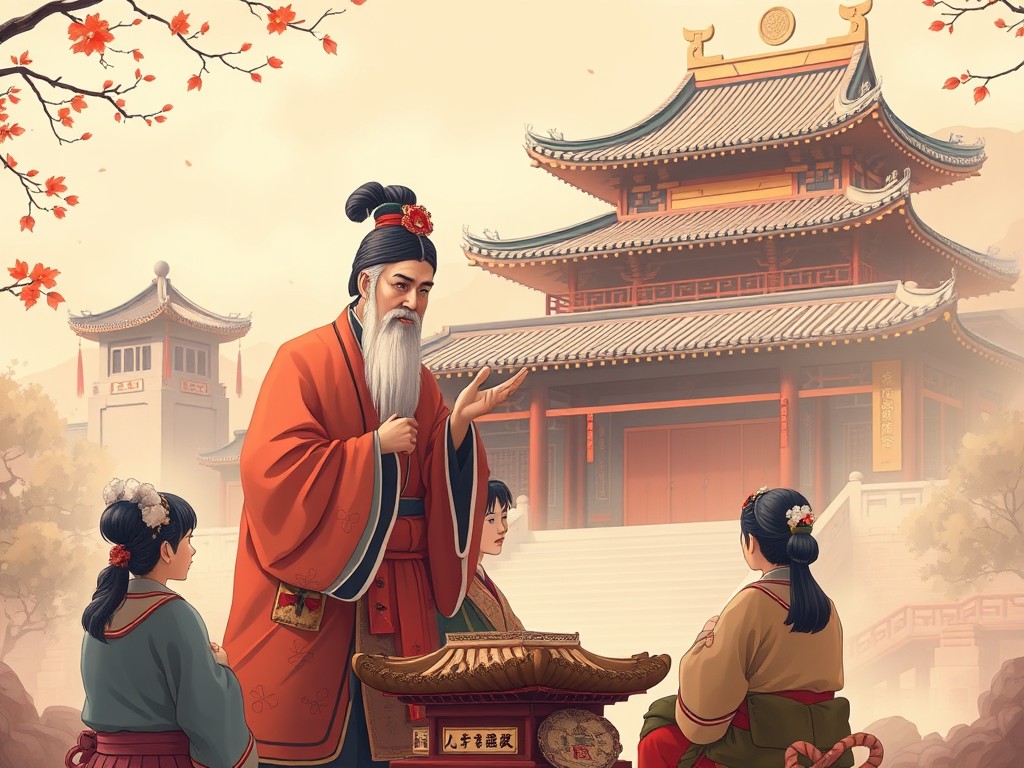A Symbiotic Bond: Exploring the Responsibilities of Rulers and Subjects
Ruler and Subject: A Core Relationship in Confucianism
In Confucianism, the relationship between ruler and subject is one of the five fundamental relationships that define social harmony and order. This particular dynamic emphasizes mutual responsibilities and ethical governance. Here’s a deeper look at this relationship:
Key Principles
- Moral Leadership:
- The ruler is expected to embody moral integrity and virtue. A good ruler leads by example, demonstrating qualities like benevolence (ren) and righteousness (yi).
- Responsibility of the Ruler:
- The ruler has a duty to care for the well-being of the subjects, ensuring their safety, happiness, and prosperity. This is often referred to as the “Mandate of Heaven,” which states that a ruler’s authority is justified by their moral character and ability to govern justly.
- Loyalty of the Subjects:
- In return, subjects are expected to show loyalty and obedience to the ruler. This loyalty is rooted in respect for the ruler’s authority, provided that the ruler acts justly and ethically.
- Social Harmony:
- This relationship is crucial for maintaining social harmony. When rulers act justly, subjects are more likely to support and respect them, leading to a stable and harmonious society.
- Consequences of Poor Governance:
- If a ruler fails to uphold their moral responsibilities, Confucianism teaches that subjects have the right to withdraw their loyalty. This idea has historically influenced the legitimacy of rulers in Chinese society.
Featured Headlines:
-
How to Start a Butchery Business in Kenya: Costs, Licences, and Tips (2026)
Spread the love How to Start a Butchery Business in Kenya: Costs, Licenses, and Tips (2026) Starting a butchery in a major Kenyan city like Nairobi, Mombasa, or Kisumu is a classic high-reward venture. While the demand for protein is constant, the urban consumer in 2025 is more discerning than ever, prioritizing hygiene, convenience, and…
-
How to Start a Profitable Salon in Kenya (2026): Costs, Licences, and Requirements
Spread the love Opening a Salon in Kenya: A 5-City Cost & Licensing Comparison (2025) Thinking of setting up a salon in Kenya? While the Business Registration Service (BRS) fee is a flat KES 950 nationwide via eCitizen, your operational costs will change the moment you pick a city. From the premium streets of Nairobi…
-
The Difference Between Hospitality and Entertainment Establishments Under Kenyan Law
Spread the love The Difference Between Hospitality and Entertainment Establishments Under Kenyan Law In Kenya’s vibrant economy, the hospitality sector is a major pillar. However, for entrepreneurs and travelers alike, the legal lines between a “Hotel,” a “Villas,” or a “Nightclub” can be blurry. In the eyes of the law—specifically the Tourism Act and the…
Historical Context
Throughout Chinese history, the relationship between ruler and subject has been pivotal in shaping political and social structures. Dynasties that emphasized Confucian ideals often promoted meritocracy and moral governance, while those that strayed from these principles faced challenges to their authority.
Contemporary Relevance
In modern discussions about governance, the ruler-subject relationship continues to be relevant. Concepts of accountability, ethical leadership, and the role of citizens in a democracy echo the teachings of Confucianism, highlighting the timeless nature of these principles.
Conclusion
The ruler-subject relationship in Confucianism emphasizes mutual respect, moral responsibility, and the importance of ethical governance. By fostering a balance between authority and moral integrity, this relationship aims to create a harmonious society where both rulers and subjects thrive.












